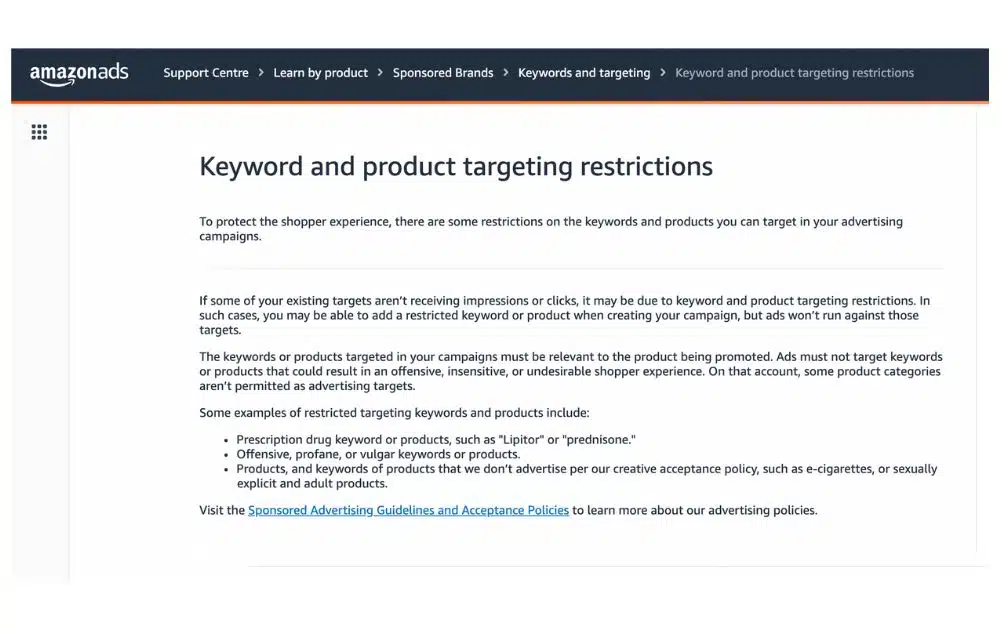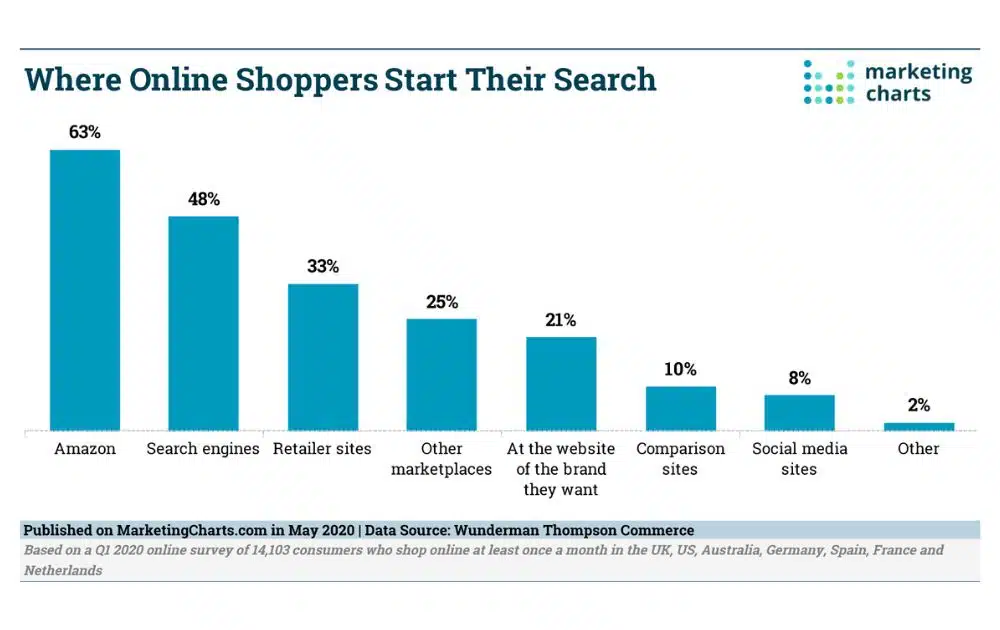Using relevant Amazon keywords is part and parcel of boosting your business in the marketplace. By optimizing your copies for Amazon search terms, you have better chances of getting your products in front of your target audience.
But did you know that not all keywords are fair game on Amazon? In fact, certain terms must be avoided completely.
Let’s discuss the Amazon restricted keyword list and why it’s important to avoid such terms. We’ll also tackle strategies to avoid them on your listing, and best practices to ensure that your SEO strategies are on point.
What are Restricted Amazon Keywords?
Restricted Amazon keywords, sometimes also called Amazon banned words, are phrases that the marketplace prohibits sellers from using in their product listings.
Just as how the marketplace maintains an Amazon restricted products list, the platform also bans certain search terms from being used, in order to maintain the platform’s integrity, safety, and compliance.
Here are the types of banned Amazon seller search terms:
Legal and Safety Concerns
These keywords include terms that relate to health claims, medical conditions, or unsafe products. For instance, unverified health benefits might be implied by certain terms, including:
- Cure
- 100% natural
- Antibacterial
- Harmless
Inappropriate Content
Terms that are offensive, explicit, or inappropriate are banned from allowed Amazon keywords, which are typically family-friendly. These terms include those related to explicit language or adult content.
Misleading Information
The banned Amazon search term list also includes deceptive terms that provide exaggerated claims about a product’s quality or effectiveness. Banning these Amazon keywords helps ensure that product listings are fair and transparent.
Misleading information terms may include:
- Best price
- Best deal
- Guaranteed
- Save money
Competitive Manipulation
Any search term or word designed to unfairly manipulate the search algorithm unfairly is included in the banned Amazon keywords list.
Manipulative keywords also include those that mislead customers about the origin or endorsement of products. These include brand names that a seller does not own.
Importance of Avoiding Restricted Keywords
Complying with Amazon’s restricted keyword policies is crucial for sellers. Data from Marketing Charts reveal that more than six in ten consumers in key markets start their online shopping searches on Amazon.

Amazon keywords searchers surpass the percentage of buyers who look for products on other marketplaces, social media, and even search engines.
Given the data above, it goes without saying that thorough keyword research for Amazon is needed to thrive in the marketplace. Alongside that, it’s also important to compare keywords with competitors and avoid any terms in the restricted Amazon keywords list.
Here are the advantages of adhering to Amazon’s keyword regulations:
- Maintaining Compliance and Visibility. Using restricted terms can lead to severe consequences such as lowered product rankings, or even account suspension. Amazon’s algorithm constantly scan listings for prohibited terms. Non-compliance can result in immediate penalties.
- Enhancing Consumer Trust. Accurate and compliant product listings build consumer trust. Users rely on honest and clear information when shopping. Prohibited terms can mislead customers and damage a seller’s reputation. Optimizing for Amazon’s Search Algorithm. Engaging in thorough keyword research for Amazon helps in identifying the right keywords that enhance your visibility without violating policies. Well-chosen keywords can significantly improve your product’s search rankings, making it easier for potential customers to find your listings.
Restricted Amazon Keywords List
Just like being aware of restricted categories on Amazon, knowing what keywords are banned on the marketplace is a must for sellers.
But here’s the thing: Amazon does not publish an official, comprehensive, prohibited Amazon keyword list. Instead, they provide guidelines and policies that outline what types of content are prohibited or restricted in product listings and ads.

Based on resources we found online, however, here’s a list of basic terms you must try to avoid to avoid getting penalized on the marketplace:
| 100% natural
100% quality guaranteed Acquired Immune Deficiency Syndrome ADD ADHD AIDS All-natural ALS Alzheimer’s Amazon choice Amazon suggested Antibacterial Anti-bacterial Antifungal Anti-fungal Anti-microbial Anxiety |
Amazon suggested
Antibacterial Anti-bacterial Antifungal Anti-fungal Anti-microbial Anxiety Approved Authentic Award-winning Bestseller HIV HPV Imported from Money back guarantee Non-toxic On sale Pesticide |
Best price
Biodegradable Cancer Certified COVID-19 Cure Diabetes Diabetic Detoxify Discounted price Don’t miss out Proven Safe Sanitize Satisfaction guaranteed Top quality Virus |
Bear in mind, though, that this Amazon-banned words list only includes the basics. There may be a lot more restricted terms out there, and the list isn’t set in stone. After all, Amazon frequently updates its restricted keyword list to adapt to new regulations and market trends.
Sellers must stay informed about these changes to ensure their listings remain compliant. Regularly reviewing the Amazon keywords list and adjusting your product descriptions accordingly can help maintain a smooth selling experience.
Strategies to Avoid Restricted Amazon Keywords
Avoiding restricted Amazon seller keywords is essential for maintaining compliance and optimizing your product listings. Here are some effective strategies and best practices to ensure your listings adhere to Amazon’s guidelines:
1. Conduct Thorough Keyword Research
Before finalizing your product listings, conduct thorough keyword research. Use tools and resources to help identify compliant keywords relevant to your product.
If you think keywords are overrated, think again. Data from Hubspot says among the top SEO strategies that are most effective for ranking highly on search engine results pages (SERPs) are optimizing on-page content for keywords and search intent and conducting keyword research.

However, knowing what keywords to use is just one piece of the puzzle. By understanding the types of keywords that Amazon restricts, you can avoid using them and focus on terms that enhance your visibility and effectiveness.
- Best Practice. Regularly cross-check your keywords with Amazon’s prohibited content. This proactive approach ensures that your listings remain compliant and up-to-date with Amazon’s policies.
2. Optimize Your Search Terms
When crafting your product titles, descriptions, and backend search terms, ensure that you optimize your search terms by focusing on relevant, compliant keywords.
Avoid using superlatives, health claims, or any terms that could be flagged by Amazon’s systems. Using clear and precise language helps in maintaining compliance and improving your product’s search ranking.
- Best Practice. Implement a systematic approach to backend search terms by organizing them into categories such as product features, uses and accessories. This structured approach helps maximize the relevance and searchability of your listings while staying compliant.
3. Use Synonyms and Alternative Phrases
Instead of using banned terms, consider alternative phrases that convey the same meaning without violating Amazon’s policies. For instance, don’t claim a product is “antibacterial.” Instead, describe it as “easy to clean” or “resists odors.”
- Best Practice. Develop a comprehensive list of alternative phrases and synonyms for common restricted keywords. Train your content team to use these alternatives consistently across all product listings to maintain compliance and improve content quality.
4. Monitor and Update Listings Regularly
Amazon frequently updates its restricted keyword list. Regularly monitor your listings and stay informed about any changes in Amazon’s policies. Updating your product descriptions and search terms ensures ongoing compliance and helps avoid potential penalties.
- Best Practice. Create a dedicated compliance checklist that includes checking for restricted keywords, updating product information, and reviewing customer feedback. Regular audits can help catch potential issues early and ensure continuous compliance.
5. Focus on High-Quality Content
High-quality product descriptions that provide detailed and accurate information can help avoid the need for restricted keywords. Focus on creating compelling content that naturally highlights the benefits and features of your products.
Using high-quality images and detailed descriptions can improve customer trust and engagement.
You can also consider tools that work to boost listings, such as A+ content. This tool allows users to add enhanced images, product comparison charts, videos, and more to your listings. This can be a big help, especially since video offers the best ROI to marketers, as per HubSpot’s data.

- Best Practice. Implement a content quality checklist that includes guidelines for product descriptions, images, and bullet points. Regularly review and update this checklist to incorporate best practices and ensure that all listings meet high-quality standards. Try out tools like A+ content if your resources permit.
6. Seek Professional Guidance
Compliance with Amazon guidelines can be tricky. If you’re uncertain about doing things correctly, consult with Amazon experts like AMZ Advisers, or legal professionals who specialize in ecommerce.
In doing so, you’ll have valuable guidance on Amazon’s policies and help ensure your listings comply with Amazon’s policies.
- Best Practice: Establish a relationship with an Amazon seller consultant who can provide ongoing support and updates. An expert can help you navigate complex compliance issues and keep your listings aligned with Amazon’s ever-changing policies.
Author




